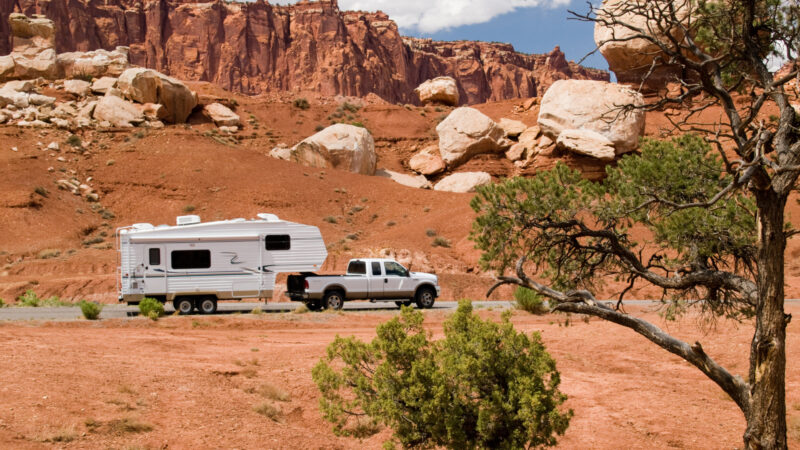Table of Contents Show
There’s much to learn if you want a smooth RVing experience. However, as the saying goes, “Where there is a will, there’s a way!” Practically anybody can learn how to travel safely and successfully in an RV.
You must possess a few skills to set yourself up for success. Unfortunately, we didn’t possess most of those abilities when we first started traveling. Luckily, we’ve learned a thing or two that we can share with you.
Today, we’re sharing some of the most important skills to have as an RVer. Let’s get started!
Is RVing Difficult?
RVing can be rewarding and full of opportunities to make memories. However, it’s not always puppy dogs and rainbows. Things do go wrong or not as planned from time to time. The more you develop your talents, the better prepared you are to handle them.
RVing can be difficult because you have so many things to remember. It can feel overwhelming to recall everything you need to do, especially at first.
We’ve found that using checklists can help simplify things, reduce stress, and ensure everything gets done and in the proper order.
Why Is It Important to Have Skills While RVing?
Having skills while RVing is essential because the lifestyle requires tremendous self-reliance.
You won’t always be in a position where you can depend on others. But you can escape many hairy situations with the proper abilities, knowledge, and tools.
Over the last several years, we’ve learned that traveling can be incredibly unpredictable. Things will break, and travel days won’t always go as planned. However, having some talents can help prevent a bad situation from worsening during unexpected circumstances.
Skills Every RVer Needs to Have
Whether you’re a weekend warrior or a full-time traveler, we’ll go over some skills every RVer needs. Let’s look at some crucial abilities you should work on before your next trip. Let’s dive in!
Hitching and Unhitching
If you already own or are considering a towable RV, you’ll need to hitch and unhitch it. Unfortunately, these processes will depend on your equipment. You must familiarize yourself with your specific gear and the necessary steps.
Growing your skills with this process can prepare you for various situations. Binding in the components and unlevel campsites often complicates the process.
However, you can adjust and handle these situations when you grow your talents. And practice makes perfect.
Driving and Maneuvering
One of the most intimidating aspects of RVing is driving and maneuvering. The first time many owners tow or drive a large vehicle is when driving their new rig off the dealership lot. Getting from point A to point B efficiently and safely requires some skills.
Maneuvering a big rig is a different experience than a standard passenger vehicle. You need more room, especially when making turns, and you must consider your height, weight, and length. We’ll get more into it later, but not every road or area will be big-rig friendly.

Basic RV Maintenance
If you want your camper to last, you must keep up with the maintenance. Sure, you can haul your rig to a service center and pay a professional to do it for you.
However, these shops typically charge around $150 an hour and don’t always provide the best results.
You’ll need to constantly keep up with big and small maintenance tasks. Everything from checking your tire pressure before each trip to inspecting your roof.
Knowing how to perform basic maintenance can help keep your RV on the road and in campsites, and out of the repair shop.
Problem-Solving
Like it or not, problems will arise while RVing. Learning to stay calm when things don’t go as planned is essential. Thinking clearly and assessing the situation can help you solve many problems.
For better or worse, other RVers often quickly chime in with their advice. However, it’s important to remember in these moments that it is your rig. It is your responsibility to understand and think through any potential solutions. If you damage your camper while trying to solve a problem, it’s your fault, not theirs.
Even if you’re not good at problem-solving, this lifestyle will help you improve. Sometimes help or assistance won’t be readily available. It might surprise you what problems you can solve when the only option is to figure it out.
Keep in Mind: Survive your travel day with these 10 Problem Solving Products!
Campsite Set Up and Tear Down
Learning how to set up and tear down your campsite gets easier the more you do it. Unfortunately, no two campsites are ever the same, which can complicate things.
Some sites may require you to use leveling gear or to be mindful of obstacles like trees or picnic tables.
The more you camp, the sooner you’ll discover what works and doesn’t work for you and those camping with you. Getting everyone on the same page during these processes can help ensure everything gets done quickly and correctly.
The less time you spend setting up and tearing down, the more time you have to spend enjoying the experience.

As we mentioned, not every road or area will be big-rig friendly. Getting from point A to point B will require some planning.
You can’t just get behind the wheel, punch in the address into your phone, and navigate to the location. You must consider low clearances, weight limits, and crowded areas.
It only takes experiencing one of these sticky situations once before you’ll see the importance of planning.
Using an RV GPS can allow you to punch in the specifics of your camper to help ensure the route is safe. However, these are typically more expensive than a standard GPS unit, but you may find it worth every penny.
Keep in Mind: See some of our favorite RV GPS options!
Resource Management
Depending on where you camp, managing your resources can be an essential skill to have. You may not always have easy access to fresh water or a dump station.
As a result, you’ll need to learn to conserve water and make your tank space last as long as possible.
In addition, it’s essential to know how and where to dump your tanks when they’re full. This may require visiting a dump station or using a portable waste tote.
Managing resources can help make it easier to enjoy yourself without worrying about running out of water or space in your tank.
Adaptability and Flexibility
Two additional important skills to have as an RVer include adaptability and flexibility. As we’ve said, things won’t always go as planned. Many things are simply beyond your control.
Getting stuck in traffic or the weather not cooperating are two situations you can do nothing about.
RVers need to make the most out of any situation. Sure, things may not be as perfect as you pictured, but that’s okay. You’ll have many more opportunities and adventures in the future. Not everything will be an Instagram-worthy moment.

Grow Your Skills While RVing
It’s incredible to see how much we didn’t know before we started traveling. However, you can learn a tremendous amount and grow your skills, whether a full-time or part-time RVer.
Additionally, if you want to continue to grow, commit to being a lifetime learner. You can always learn something from someone, so don’t hesitate to chat with your neighbors. They may teach you something you didn’t know.
Do you need to brush up on some of these skills?






